29th April 2016, 11:03 am
Nicola Marino has offered to post the following preprint:
Irrational Exponents in Fermat’s Last Theorem. The n > 2 case.
by Nicola Marino
In this paper we find explicit irrational exponents greater than 2 solving the Fermat equation, which we call Algebraically Derived Ratio of Irrational (or ADRI) numbers. We then further expand the class of ADRI numbers to cover all the solution exponents for any Fermat equation.
Continue reading
11th November 2015, 11:42 am
In my Discrete Math class today, Ryan Patton asked to prove Euler’s circuit theorem by induction on the number of vertices. Alex Summers contributed an idea about pairing/short-cutting instead of removing the edges incident to a deleted vertex. The class came up with the following proof. Is this proof out there somewhere?
Theorem (Euler). A pseudograph has a circuit containing all edges and vertices if it is connected and every vertex has even degree.
Proof by induction on the number n of vertices.
Base case n=1. Just follow the loops in succession.
Now assume for n and prove for a pseudo-graph of n+1 vertices. Pick a vertex. Since degree even, you can pair the incident edges, and you can avoid pairing the two ends of a loop. Short-cut each pair to avoid the vertex and delete it. By induction, each component of the new pseudo-graph has the desired circuit. Now restore the vertex and undo the short cuts to obtain the desired circuit.
Category:
Education,
Math |
Comments Off on Euler’s Theorem by Induction on Vertices
14th August 2015, 02:14 pm
Relaxed Disk Packings
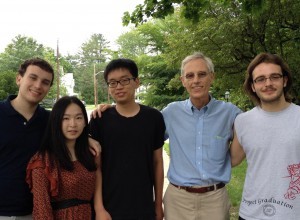 by John Berry, Matthew Dannenberg, Jason Liang, and Yengyi Zeng
by John Berry, Matthew Dannenberg, Jason Liang, and Yengyi Zeng
2015 NSF “SMALL” undergraduate research Geometry Group
With update below by Iglesias-Ham (all already known).
Abstract. The classic result about the optimal hexagonal packing of unit disks in the plane has recently been partially generalized by Edelsbrunner et al. to allow but penalize overlap for the case of lattice packings. We attempt to remove the restriction to lattice packings. Continue reading ‘Relaxed Disk Packings’ »
Category:
Math |
Comments Off on Relaxed Disk Packings
10th August 2015, 06:34 am
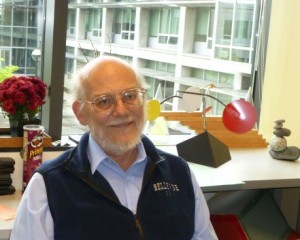 When speaking at the 2015 Washington Two-Year Mathematics Conference at Campbell’s Resort, Lake Chelan, I met many wonderful people, including Dale Hoffman of Bellevue College (formerly Bellevue Community College), who agreed to send me the following inspiring chronicle of some of his past students: Continue reading ‘Dale Hoffman on Community College Students’ »
When speaking at the 2015 Washington Two-Year Mathematics Conference at Campbell’s Resort, Lake Chelan, I met many wonderful people, including Dale Hoffman of Bellevue College (formerly Bellevue Community College), who agreed to send me the following inspiring chronicle of some of his past students: Continue reading ‘Dale Hoffman on Community College Students’ »
Category:
Articles |
Comments Off on Dale Hoffman on Community College Students
16th June 2015, 05:59 am
Guest post by Lorna Larsen, whom I met at the 2015 Washington State Two-Year College Mathematics Conference. After years as a painter, Lorna returned to school and this fall takes over as the Math Learning Center Tutor Supervisor at Shoreline Community College. Her children often attended class with her and are now both interested in education, one working with developmentally disabled adults.
Spring of 2002 was the beginning of the season that would make or break me as a painting contractor. I’d decided two years earlier to put my experience to work for me, and in some ways it was paying off. I was finally starting to charge what I was worth. But both the kids were still small, and I was constantly torn between their needs and my company’s. The mountain of taxes, bids, payroll, invoices and all the other things that go with small business ownership was becoming an avalanche. Continue reading ‘Back To School at Age 35’ »
Category:
Education |
Comments Off on Back To School at Age 35
14th May 2015, 04:44 pm
Math enrollments rise from 7 to 65.
Guest post by Professor Umesh Nagarkatte, Medgar Evers College, CUNY
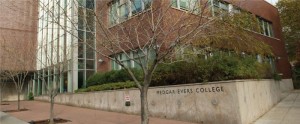 In urban colleges, student attrition due to absenteeism and failure has been a common problem. Attrition happens because students get bogged down by academic and non-academic issues. In 2002, three faculty members found that the Theory of Constraints (TOC) and its logic-based Thinking Processes (TP) tools can address both absenteeism and failure. They began with two weeks training in TOC and TP at Goldratt Institute, New Haven, CT, and the chair got departmental agreement for a new approach for Spring 2002. Continue reading ‘Medgar Evers uses TOC to Stem Attrition’ »
In urban colleges, student attrition due to absenteeism and failure has been a common problem. Attrition happens because students get bogged down by academic and non-academic issues. In 2002, three faculty members found that the Theory of Constraints (TOC) and its logic-based Thinking Processes (TP) tools can address both absenteeism and failure. They began with two weeks training in TOC and TP at Goldratt Institute, New Haven, CT, and the chair got departmental agreement for a new approach for Spring 2002. Continue reading ‘Medgar Evers uses TOC to Stem Attrition’ »
Category:
Education |
Comments Off on Medgar Evers uses TOC to Stem Attrition
31st January 2015, 06:48 am
Updated with new discoveries 31 January —11 February 2015 and 3 April 2019; first published 27 May 2014. (Incidentally, new type of pentagonal tile discovered July 2015 by Casey Mann, Jennifer McLoud-Mann, and David Von Derauc. And that’s it, as proved July 2017 by Michaël Rao, arX). For these examples and a proof that symmetry groups with order three rotations cannot occur, see John Berry, Matthew Dannenberg, Jason Liang, Yingyi Zeng, Symmetries of Cairo-Prismatic tilings, Rose-Hulman Und. Math. J. 17 (2016), http://scholar.rose-hulman.edu/rhumj/vol17/iss2/3.
A joint paper [C1] with my SMALL undergraduate research Geometry Group found least-perimeter pentagonal unit-area tiles, Cairo and Prismatic:
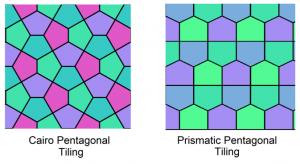 They proved that mixtures of unit-area convex pentagonal tiles can do no better, but found many examples of Cairo-Prismatic tilings that do equally well [C1, C2], one appearing in the new Math Library at Williams:
They proved that mixtures of unit-area convex pentagonal tiles can do no better, but found many examples of Cairo-Prismatic tilings that do equally well [C1, C2], one appearing in the new Math Library at Williams:
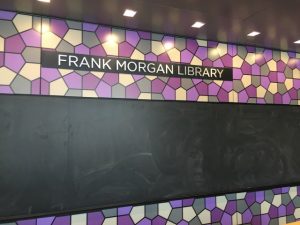
Since their work nine more have been discovered. Continue reading ‘New Optimal Pentagonal Tilings’ »
22nd December 2014, 07:59 pm
 I’ve spent Fall 2014 of my sabbatical year from Williams College at Berkshire Community College as Visiting Professor (teaching developmental algebra) and Special Assistant to the President. I went because I had gradually come to feel that community colleges are where education meets the future, with the full diversity of students of all ages, backgrounds, interests, histories, part time and full time, soon to comprise a majority of all American college students.
I’ve spent Fall 2014 of my sabbatical year from Williams College at Berkshire Community College as Visiting Professor (teaching developmental algebra) and Special Assistant to the President. I went because I had gradually come to feel that community colleges are where education meets the future, with the full diversity of students of all ages, backgrounds, interests, histories, part time and full time, soon to comprise a majority of all American college students. 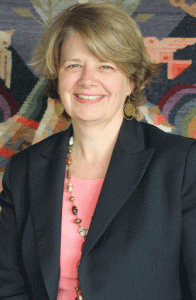 I went because I loved the president (Ellen Kennedy) for her understanding of the place, her vision for the future, her humble openness in dealing with everyone. I taught beginning developmental algebra (MAT 028) because it is the most problematic course, the major barrier to students’ making it to graduation, a course in which a third of the students withdraw, a third fail, and only a third pass.
I went because I loved the president (Ellen Kennedy) for her understanding of the place, her vision for the future, her humble openness in dealing with everyone. I taught beginning developmental algebra (MAT 028) because it is the most problematic course, the major barrier to students’ making it to graduation, a course in which a third of the students withdraw, a third fail, and only a third pass.
Despite the lack of funds and the challenges faced by students, faculty, and staff, everyone loves the place and its possibilities. It was an honor and a joy to be part of it. See guest blog posts by my generous colleagues Donna Kalinowsky, math chair Nancy Zuber, and Fayette Reynolds.
 I had two Williams colleagues and friends down to visit. Ed Burger, now President of Southwestern University, spoke on “The Five Elements of Effective Thinking.” Colin Adams did his “Zombies and Calculus“; see his Nova Video 1 and Video 2. I established a high school speakers bureau. I ran a Friends of Math luncheon series. I organized a bus trip of over forty students, faculty, and staff to visit the Museum of Mathematics in New York City. I wrote a Huffington Post blog on “Adding Fractions.”
I had two Williams colleagues and friends down to visit. Ed Burger, now President of Southwestern University, spoke on “The Five Elements of Effective Thinking.” Colin Adams did his “Zombies and Calculus“; see his Nova Video 1 and Video 2. I established a high school speakers bureau. I ran a Friends of Math luncheon series. I organized a bus trip of over forty students, faculty, and staff to visit the Museum of Mathematics in New York City. I wrote a Huffington Post blog on “Adding Fractions.”
I was interviewed on Rick Chrisman’s “1350 West Street” local TV show, Part 1 and Part 2.
OTHER RELATED VIDEOS: Continue reading ‘Berkshire Community College’ »
22nd December 2014, 07:58 pm
The following post was written by one of my star algebra students at Berkshire Community College, in a desire to help students in similar situations.
“Ready or Not” by Aaron Biros
The harshest thing each of us faces on a daily basis is a wakeup call. This could mean the wretched sound of that insufferable alarm clock, a pathetic paycheck for an epic work week, or struggling through a class you hate. Regardless of which of these haunts your thoughts, they are part of the many challenges of success. From my experiences thus far, the best opportunity any of us have to advance ourselves socially, intellectually, and, of course, financially is through education and perseverance. Realizing this for myself was a harsh wakeup call for sure. Continue reading ‘Algebra Student Exhorts his Peers to Make the Most of their Opportunities’ »
Category:
Education |
Comments Off on Algebra Student Exhorts his Peers to Make the Most of their Opportunities
13th December 2014, 11:45 am
Guest post by Fayette Reynolds, Professor of Life Sciences, BCC
We have many sturdy, fortunate and accomplished students who come to Berkshire Community College (BCC) for practical reasons. But there are also many students who have difficult histories, who carry overwhelming personal burdens. They may not know or believe in themselves. Nor do they believe in the possibility of a fresh start, or new direction. BCC is a place where we look at our students with fresh, curious and affectionate eyes. We believe in them and in their courage, their strength and their potential to create productive and significant lives. They are remarkable.
Whenever I myself felt overwhelmed I would call my dad, and he would laugh and say to me, “Be like a leaf floating down a stream. Just keep your head above water.” Just don’t give up.







 Welcome to my blog. I also have a blog at the
Welcome to my blog. I also have a blog at the